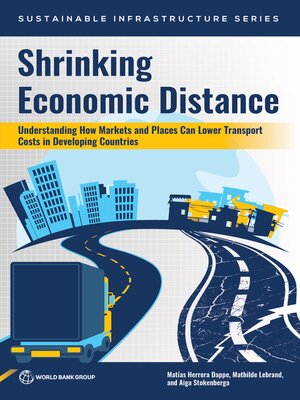Shrinking Economic Distance
ebook ∣ Understanding How Markets and Places Can Lower Transport Costs in Developing Countries · Sustainable Infrastructure
By Matías Herrera Dappe

Sign up to save your library
With an OverDrive account, you can save your favorite libraries for at-a-glance information about availability. Find out more about OverDrive accounts.
Find this title in Libby, the library reading app by OverDrive.



Search for a digital library with this title
Title found at these libraries:
| Library Name | Distance |
|---|---|
| Loading... |
Despite the reduction in transport costs over the past few decades, creating a single integrated economy remains elusive. Low- and middle-income countries face higher transport prices than high-income countries for both international and domestic shipments, and shipping times are longer andless reliable. Tackling the problem can increase income and general welfare in low- and middle-income countries, improving the lives of the people who live there.Shrinking Economic Distance: Understanding How Markets and Places Can Lower Transport Costs in Developing Countries makes a unique contribution by assessing the main determinants of shippers' economic costs of freight transport—economic distance—and identifying the frictions that keep transport prices above an efficient level, shipping times high, and reliability low. Drawing on new analyses and compiling many others, the book provides important evidence to inform the design of policies to reduce the economic costs of transport and deepen the economic integration of developing countries.This book shows how understanding the frictions driving the economic costs of freight transport can help policy makers target reforms in the areas in which they can have the greatest impact and avoid unintended consequences. It lays out the building blocks for a reform agenda to reduce economic distance, which includes first making markets and then making places efficient. Shrinking Economic Distance will be of enormous value to policy makers, practitioners, and academics interested in freight transport and economic integration.







